Items
Search full-text
“Australia Council releases its first Disability Action Plan”
- Cameron Noble
- Cam Noble
- Anthony Romagnano
-
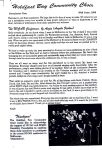 "Tutti Ensemble - Holdfast Bay Community Choir Newsletter - Newsletter One - 1999" Tutti Ensemble, Holdfast Bay Communitty Choir, first newsletter distributed by Tutti Ensemble and Minda Inc disability service organisation in 1999 - reads, in part "Welcome to our first newsletter. We hope this is the first of many to come. We intend to put out a newsletter every two months to keep people informed on what is happening in the choir. Articles or information from choir members are welcome."
"Tutti Ensemble - Holdfast Bay Community Choir Newsletter - Newsletter One - 1999" Tutti Ensemble, Holdfast Bay Communitty Choir, first newsletter distributed by Tutti Ensemble and Minda Inc disability service organisation in 1999 - reads, in part "Welcome to our first newsletter. We hope this is the first of many to come. We intend to put out a newsletter every two months to keep people informed on what is happening in the choir. Articles or information from choir members are welcome." -
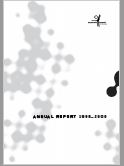 "Australia Council - Annual Report 1999-2000" Australia Council Annual Report 1999-2000 - discusses letter from chair of council, corporate overview, year in review, financial statements, analysis of funding and grants for projects, programs, presentation and promotions, triennial grants to disability arts organisations in NSW, South Australia and Victoria and funding to Accessible Arts for audience development, as well as the New Media Arts Fund for Back to Back performance of “Soft”
"Australia Council - Annual Report 1999-2000" Australia Council Annual Report 1999-2000 - discusses letter from chair of council, corporate overview, year in review, financial statements, analysis of funding and grants for projects, programs, presentation and promotions, triennial grants to disability arts organisations in NSW, South Australia and Victoria and funding to Accessible Arts for audience development, as well as the New Media Arts Fund for Back to Back performance of “Soft” -
 "Tutti Arts - Rebellious Passion Exhibition - Promotional Card" Tutti Arts - 'Rebellious Passion' Exhibition Promotional Card - reads, in part "Tutti Arts opens for its first studio exhibition at the Tutti Arts Centre at Brighton. Rebellious Passion is an eclectic exhibition that showcases the work of 40 disabled artists. Visitors can experience the everyday magic of the artists at work while viewing their extraordinary work on the walls."
"Tutti Arts - Rebellious Passion Exhibition - Promotional Card" Tutti Arts - 'Rebellious Passion' Exhibition Promotional Card - reads, in part "Tutti Arts opens for its first studio exhibition at the Tutti Arts Centre at Brighton. Rebellious Passion is an eclectic exhibition that showcases the work of 40 disabled artists. Visitors can experience the everyday magic of the artists at work while viewing their extraordinary work on the walls." -
“Arts Project Australia is founded in 1974” In 1974, Myra Hilgendorf OAM founded Arts Project Australia, an organisation whose aim is for artists with an intellectual disability to have their work presented in a professional manner. In 1984, Arts Project moved to Hawthorn, Melbourne and started a studio workshop program. The organisation became an Incorporated Association in 1986. In 1994, Arts Project Australia artists exhibited their work internationally. Exhibitions occurred at MADMuseé and Centre d’Art Differencié in Belgium. Artist Julian Martin was selected for the Moët & Chandon Touring Exhibition. Arts Project published an education/slide kit in 1994 called ‘Between the Lines: Visual Arts and Intellectual Disability’. The organisation first published ‘Outline: News from Arts Project Australia’ in 1996. Arts Project Australia was recognised by the National Gallery of Australia in 2013 for having international significance.
-
“Research project ‘Disability and the Performing Arts in Australia: The Last Avant Garde’ investigates the creative and aesthetic strategies of the Australian disability arts sector” A research project beginning in 2016, ‘Disability and the Performing Arts in Australia: The Last Avant Garde,’ investigated the creative and aesthetic strategies of the Australian disability arts sector. The project sought to map “disability arts practice across the nation” by examining “the role of artistic experimentation,” “co-design[ing] accessible strategies,” and raising “critical recognition, employment and funding opportunities for artists.” The project team describes themselves as a collective “of deaf and disabled and non-disabled researcher artists, performers, writers, arts managers and theatre makers.” The work was the result of a collaboration between Arts Access Victoria, University of Melbourne, and University of Sydney. The Australia Research Council provided funding for the research.
-
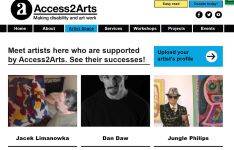 "Access2Arts Artist Profiles as first added to website in 2017" Access to Arts Artist Profiles as first added to website in 2017
"Access2Arts Artist Profiles as first added to website in 2017" Access to Arts Artist Profiles as first added to website in 2017 -
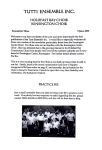 "Tutti Ensemble - Holdfast Bay Choir / Kensington Choir Newsletter - Newsletter Three - 2001" Tutti Ensemble, Holdfast Bay Choir / Kensington Choir, third newsletter, first by Tutti Ensemble Inc. in 2001- reads, in part "Welcome to our first newsletter of the year and more importantly the first publication of the Tutti Ensemble Inc."
"Tutti Ensemble - Holdfast Bay Choir / Kensington Choir Newsletter - Newsletter Three - 2001" Tutti Ensemble, Holdfast Bay Choir / Kensington Choir, third newsletter, first by Tutti Ensemble Inc. in 2001- reads, in part "Welcome to our first newsletter of the year and more importantly the first publication of the Tutti Ensemble Inc." -
“The Bolshy Divas present ‘The Other 100 Conversations’ to Australian governments heads” In 2011, a group of disability activists called the Bolshy Divas presented a 100-page document, ‘The Other 100 Conversations,’ to heads of all Australian governments who had gathered in Canberra for a Council of Australian Governments (COAG) meeting. The document was addressed “to our elected representatives”. ‘The Other 100 Conversations’ comprised of 100 first-person accounts of participants of disability services in Western Australia, highlighting the lack of support and waiting times experienced.
- High Beam Festival
-
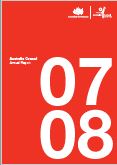 "Australia Council - Annual Report 2007-08" Australia Council Annual Report 2007-08 - discusses letter from chairman, year in review, from the CEO, Excellent and Distinctive Art from various artforms, Access for all Australians from various artforms, A strong and vibrant arts sector including artist’s earnings, philanthropic support and arts sector development, About the Australia Council, Governance, Organisation, Accountability, Workplace and Financial statements but no longer listing grants of organisations or individuals however discusses the DADAA WA radio play “The Proper Shoes” - a series of stories written by young women with a disability, was first broadcast nationally on ABC Radio and then invited to tour the play as part of the TRASNA Festival of Inclusive Theatre.
"Australia Council - Annual Report 2007-08" Australia Council Annual Report 2007-08 - discusses letter from chairman, year in review, from the CEO, Excellent and Distinctive Art from various artforms, Access for all Australians from various artforms, A strong and vibrant arts sector including artist’s earnings, philanthropic support and arts sector development, About the Australia Council, Governance, Organisation, Accountability, Workplace and Financial statements but no longer listing grants of organisations or individuals however discusses the DADAA WA radio play “The Proper Shoes” - a series of stories written by young women with a disability, was first broadcast nationally on ABC Radio and then invited to tour the play as part of the TRASNA Festival of Inclusive Theatre. - Peter Ben
-
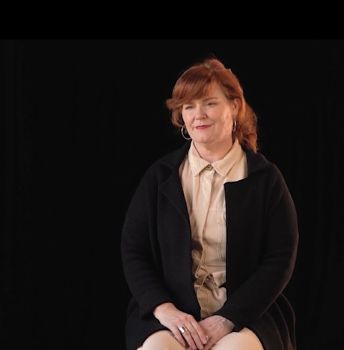 "Interview with Julie Moralee" Julie Moralee is the Chief Executive Officer of Restless Dance Theatre, bringing a wealth of experience in marketing, business development, and festival organisation within the arts sector. Her leadership focuses on showcasing the talents of artists with disability and ensuring sustainable employment opportunities in the arts. Interview Summary Julie Moralee is the CEO of Restless Dance Theatre, where she has focused on promoting the talent and abilities of artists with disability. With a commitment to ensuring sustainable full-time employment in the arts for these artists, she emphasises the importance of audience impact and high-quality performances as measures of success. Julie is mindful of the challenges and perceptions within the disability arts sector and envisions a future where the label "disability art" becomes obsolete, as the quality of the work transcends its creators
"Interview with Julie Moralee" Julie Moralee is the Chief Executive Officer of Restless Dance Theatre, bringing a wealth of experience in marketing, business development, and festival organisation within the arts sector. Her leadership focuses on showcasing the talents of artists with disability and ensuring sustainable employment opportunities in the arts. Interview Summary Julie Moralee is the CEO of Restless Dance Theatre, where she has focused on promoting the talent and abilities of artists with disability. With a commitment to ensuring sustainable full-time employment in the arts for these artists, she emphasises the importance of audience impact and high-quality performances as measures of success. Julie is mindful of the challenges and perceptions within the disability arts sector and envisions a future where the label "disability art" becomes obsolete, as the quality of the work transcends its creators -
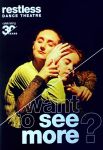 "Restless Dance - Celebrating 30 Years - Promotional Flyer" Restless Dance - Celebrating 30 Years - Promotional Flyer - reads, in part "Now in its 30th year, Restless collal)orates with some of the industry's most renowned choreographers, companies and artists. We create performance work that is presented at prestigious festivals and venues around Australia and internationally. Our workshop program continues to be an incubator for dancers, It creates a pathway for artists to pursue a career in dance. It is the past successes of Restless that have caused the arts sector to be devastated by the news that The Australia Council for the Arts will no longer fund the company through the multi-year funding program (2022 - 2024). It is important that Australia understands the impact this decision will have on the company. Whilst we have funding to continue to produce work, our operational funding ceases at the end of 2021."
"Restless Dance - Celebrating 30 Years - Promotional Flyer" Restless Dance - Celebrating 30 Years - Promotional Flyer - reads, in part "Now in its 30th year, Restless collal)orates with some of the industry's most renowned choreographers, companies and artists. We create performance work that is presented at prestigious festivals and venues around Australia and internationally. Our workshop program continues to be an incubator for dancers, It creates a pathway for artists to pursue a career in dance. It is the past successes of Restless that have caused the arts sector to be devastated by the news that The Australia Council for the Arts will no longer fund the company through the multi-year funding program (2022 - 2024). It is important that Australia understands the impact this decision will have on the company. Whilst we have funding to continue to produce work, our operational funding ceases at the end of 2021." - Dr Cheryl Daye
- Cheryl Daye
- Cheryl Day
-
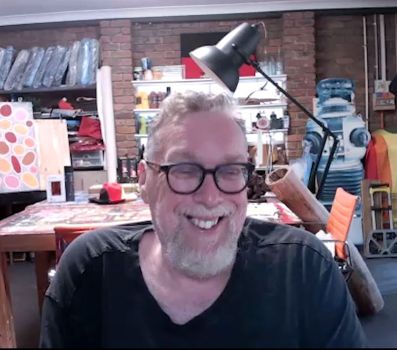 "Interview with Paul Constable Calcott" Uncle Paul Constable Calcott is a proud Wiradjuri man and artist living with a disability on Gubbi Gubbi country….. Uncle Paul uses his art to share stories of his journey as an aboriginal gay man living with a disability in urban Australia. Interview Summary Uncle Paul Calcott is a proud Wiradjuri elder and disability advocate who contracted polio as a child. During the interview, Uncle Paul discusses becoming an artist later in life through the encouragement of his husband and influenced by the storytelling of his culture. He embraces his identity as an Aboriginal, gay man living with disability. He talks about his artwork aiming to celebrate the achievements and contributions of people with disabilities, using traditional symbols to tell new stories, particularly about disability within Indigenous communities. Although there has been increased visibility and acknowledgment of disability arts in Australia, Paul notes that there's still a long way to go in terms of policy, funding, and public recognition. Uncle Paul says art can reflect political and social issues, and he proudly identifies as an artist with a disability and believes in the significance of diverse stories being told through the arts.
"Interview with Paul Constable Calcott" Uncle Paul Constable Calcott is a proud Wiradjuri man and artist living with a disability on Gubbi Gubbi country….. Uncle Paul uses his art to share stories of his journey as an aboriginal gay man living with a disability in urban Australia. Interview Summary Uncle Paul Calcott is a proud Wiradjuri elder and disability advocate who contracted polio as a child. During the interview, Uncle Paul discusses becoming an artist later in life through the encouragement of his husband and influenced by the storytelling of his culture. He embraces his identity as an Aboriginal, gay man living with disability. He talks about his artwork aiming to celebrate the achievements and contributions of people with disabilities, using traditional symbols to tell new stories, particularly about disability within Indigenous communities. Although there has been increased visibility and acknowledgment of disability arts in Australia, Paul notes that there's still a long way to go in terms of policy, funding, and public recognition. Uncle Paul says art can reflect political and social issues, and he proudly identifies as an artist with a disability and believes in the significance of diverse stories being told through the arts. - Leo Cussen
-
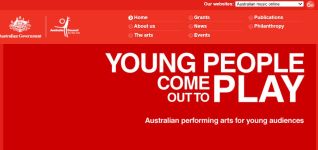 “Australia Council for the Arts website captured 2008” The website reads “The Australia Council for the Arts is the Australian Government's arts funding and advisory body.” – links to the arts, Grants, News, Events, Publications, Philanthropy.
“Australia Council for the Arts website captured 2008” The website reads “The Australia Council for the Arts is the Australian Government's arts funding and advisory body.” – links to the arts, Grants, News, Events, Publications, Philanthropy. -
"Australia Council: Australian Arts Snapshots - Disability & the Arts (2002)" Reads, in part "Australians who have a disability are recognised as being creators of innovative, thought provoking, high quality, and often very irreverent artistic product. They are active across all artforms in mainstream and community arts contexts"
-
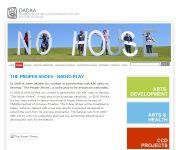 "DADAA - The Proper Shoes - Radio Play 2007" DADAA - 'The Proper Shoes' Radio Play 2007 - reads, in part "In 2005 & 2006 DADAA Inc worked in partnership with ABC radio to develop "The Proper Shoes", a radio play to be broadcast nationally. In 2005 & 2006 DADAA Inc worked in partnership with ABC radio to develop "The Proper Shoes", a radio play to be broadcast nationally. In 2007 DADAA Inc has been invited to take a reworking of Proper Shoes to be part of TRASNA Festival of Inclusive Theatre. The Proper Shoes will be broadcast in Callan, Kilkenny Ireland with a live site specific component developed to extend the work from its previous incarnation. The festival runs from 26th - 28th Oct 07 with two production staff and two performers attending and devising the work for the festival."
"DADAA - The Proper Shoes - Radio Play 2007" DADAA - 'The Proper Shoes' Radio Play 2007 - reads, in part "In 2005 & 2006 DADAA Inc worked in partnership with ABC radio to develop "The Proper Shoes", a radio play to be broadcast nationally. In 2005 & 2006 DADAA Inc worked in partnership with ABC radio to develop "The Proper Shoes", a radio play to be broadcast nationally. In 2007 DADAA Inc has been invited to take a reworking of Proper Shoes to be part of TRASNA Festival of Inclusive Theatre. The Proper Shoes will be broadcast in Callan, Kilkenny Ireland with a live site specific component developed to extend the work from its previous incarnation. The festival runs from 26th - 28th Oct 07 with two production staff and two performers attending and devising the work for the festival." -
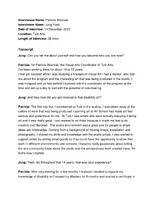 "Interview with Patricia Wozniak" Patricia Wozniak is a neurodivergent visual arts coordinator at Tutti Arts and is a disability arts advocate and ally. Interview Summary Patricia Wozniak, a visual arts coordinator at Tutti Arts with 14-15 years of experience, initially volunteered while studying for her master's and found joy and liberation in making art with the organisation. Tutti Arts has grown from offering two days to five days of visual arts each week and supports artists to enjoy creating, access quality materials, and earn income. While faced with challenges like NDIS funding intricacies and the need for easy-to-understand contracts, Patricia emphasizes the importance of artist-driven practice and equal opportunities. She observes a shift toward digital art and commercial endeavours among artists and asserts the vitality of educating artists about their rights and the political aspect of disability art in cultivating change and expression of identity.
"Interview with Patricia Wozniak" Patricia Wozniak is a neurodivergent visual arts coordinator at Tutti Arts and is a disability arts advocate and ally. Interview Summary Patricia Wozniak, a visual arts coordinator at Tutti Arts with 14-15 years of experience, initially volunteered while studying for her master's and found joy and liberation in making art with the organisation. Tutti Arts has grown from offering two days to five days of visual arts each week and supports artists to enjoy creating, access quality materials, and earn income. While faced with challenges like NDIS funding intricacies and the need for easy-to-understand contracts, Patricia emphasizes the importance of artist-driven practice and equal opportunities. She observes a shift toward digital art and commercial endeavours among artists and asserts the vitality of educating artists about their rights and the political aspect of disability art in cultivating change and expression of identity.
